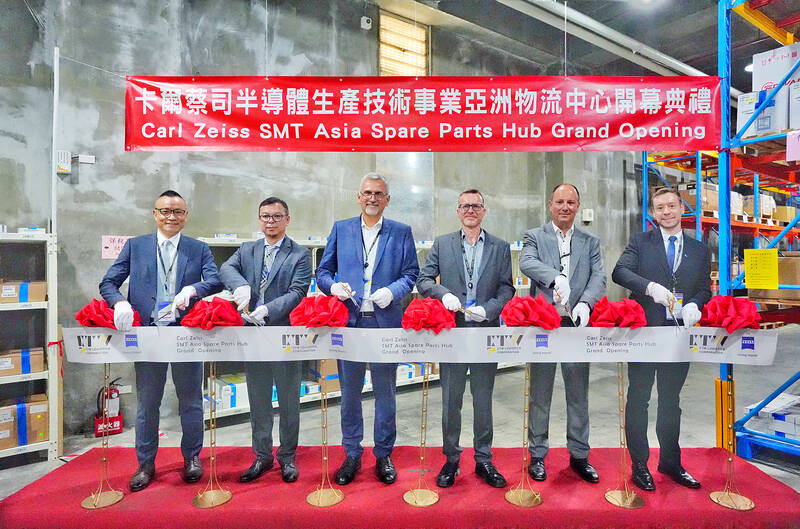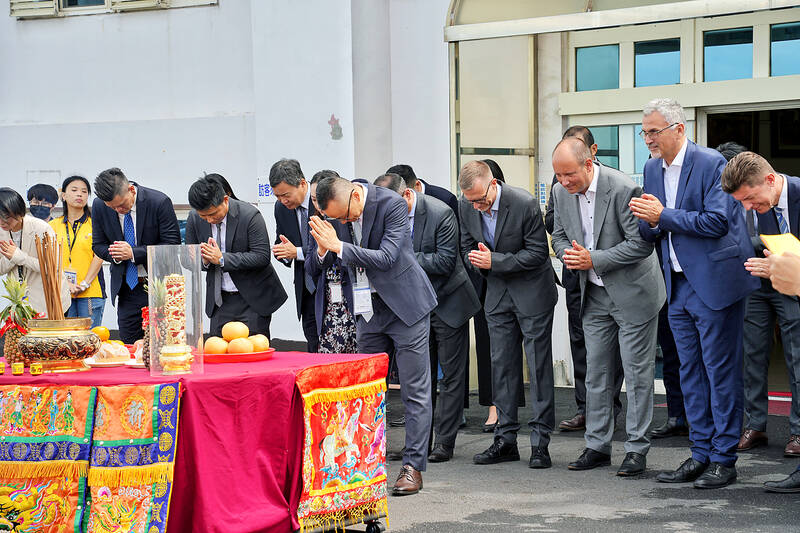CTW Logistics and Germany’s ZEISS Semiconductor Manufacturing Technology (SMT) have announced the official inauguration of their Asian logistics center located in Taoyuan. This project partnership aims to provide more efficient supply chain services for the semiconductor industry, enhancing overall industry resilience.
The grand opening ceremony was attended by representatives from the semiconductor industry and the German Trade Office Taipei, marking a significant milestone for Taiwan’s position in the global semiconductor supply chain.
Situated in Yangmei, Taoyuan, the newly launched logistics center will offer Taiwanese and Asian customers bonded solutions, inventory management, value-added services, real-time supply chain visibility, Business Agent Scheme, and other comprehensive services. To support this hub, CTW Logistics has provided a special infrastructure for sensitive components, providing relevant value-added services within the cleanroom. In terms of sustainability, CTW Logistics has implemented digital technologies such as the Internet of Things to manage environmental variables and energy within the logistics center. They have also collaborated with Carl ZEISS to establish a modern IT infrastructure enabling real-time data exchange.

As a key logistics service provider for the semiconductor industry, CTW Logistics has accumulated extensive expertise through longstanding partnerships with global recognized manufacturers. With a service network covering the entirety of Taiwan, the company offers various critical logistics services for the semiconductor supply chain, including wafers, key components, hazardous materials, special gases, and dangerous chemicals. CTW Logistics also plans to complete the construction of the Tainan International Logistics Center in 2024, further reinforcing its service capabilities in the southern region.
During the ceremony, representatives from CTW Logistics ZEISS SMT jointly inaugurated the Asia Hub. Moving forward, the two companies will collaborate to usher in a new era for the semiconductor industry, providing customers with superior logistics support services.


UNCERTAINTY: Innolux activated a stringent supply chain management mechanism, as it did during the COVID-19 pandemic, to ensure optimal inventory levels for customers Flat-panel display makers AUO Corp (友達) and Innolux Corp (群創) yesterday said that about 12 to 20 percent of their display business is at risk of potential US tariffs and that they would relocate production or shipment destinations to mitigate the levies’ effects. US tariffs would have a direct impact of US$200 million on AUO’s revenue, company chairman Paul Peng (彭雙浪) told reporters on the sidelines of the Touch Taiwan trade show in Taipei yesterday. That would make up about 12 percent of the company’s overall revenue. To cope with the tariff uncertainty, AUO plans to allocate its production to manufacturing facilities in

Taiwan will prioritize the development of silicon photonics by taking advantage of its strength in the semiconductor industry to build another shield to protect the local economy, National Development Council (NDC) Minister Paul Liu (劉鏡清) said yesterday. Speaking at a meeting of the legislature’s Economics Committee, Liu said Taiwan already has the artificial intelligence (AI) industry as a shield, after the semiconductor industry, to safeguard the country, and is looking at new unique fields to build more economic shields. While Taiwan will further strengthen its existing shields, over the longer term, the country is determined to focus on such potential segments as

TAKING STOCK: A Taiwanese cookware firm in Vietnam urged customers to assess inventory or place orders early so shipments can reach the US while tariffs are paused Taiwanese businesses in Vietnam are exploring alternatives after the White House imposed a 46 percent import duty on Vietnamese goods, following US President Donald Trump’s announcement of “reciprocal” tariffs on the US’ trading partners. Lo Shih-liang (羅世良), chairman of Brico Industry Co (裕茂工業), a Taiwanese company that manufactures cast iron cookware and stove components in Vietnam, said that more than 40 percent of his business was tied to the US market, describing the constant US policy shifts as an emotional roller coaster. “I work during the day and stay up all night watching the news. I’ve been following US news until 3am

COLLABORATION: Given Taiwan’s key position in global supply chains, the US firm is discussing strategies with local partners and clients to deal with global uncertainties Advanced Micro Devices Inc (AMD) yesterday said it is meeting with local ecosystem partners, including Taiwan Semiconductor Manufacturing Co (TSMC, 台積電), to discuss strategies, including long-term manufacturing, to navigate uncertainties such as US tariffs, as Taiwan occupies an important position in global supply chains. AMD chief executive officer Lisa Su (蘇姿丰) told reporters that Taiwan is an important part of the chip designer’s ecosystem and she is discussing with partners and customers in Taiwan to forge strong collaborations on different areas during this critical period. AMD has just become the first artificial-intelligence (AI) server chip customer of TSMC to utilize its advanced